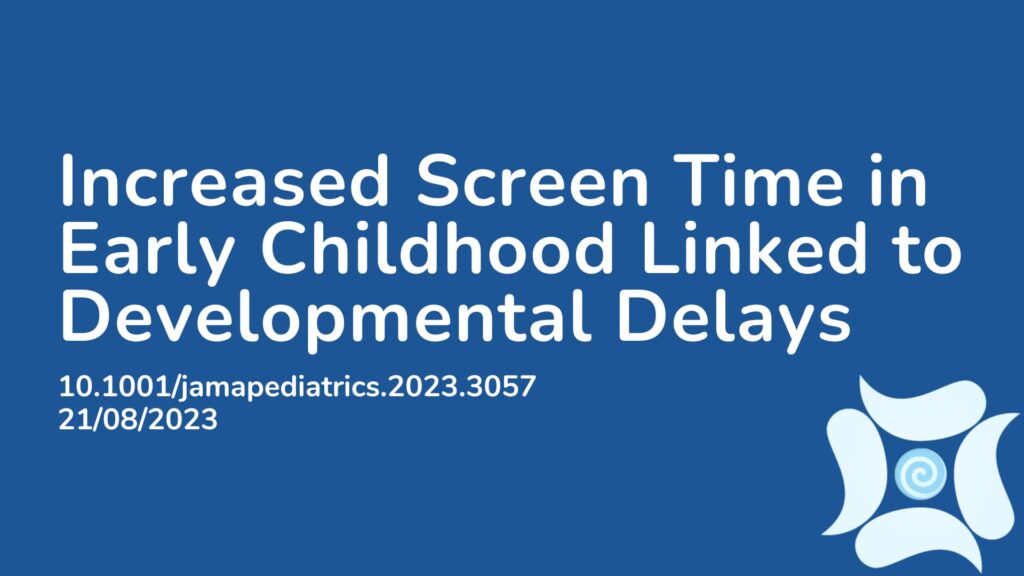Summary:
The amount of time children spend using screens is increasing, including watching TV, playing video games, and using phones and tablets. The World Health Organization and the American Academy of Pediatrics recommend limiting screen time for young children, advising no more than 1 hour per day for children aged 2 to 5 years. However, many children exceed these limits, particularly after the COVID-19 pandemic, raising concerns about the impact of screen time on child development. Previous research has linked excessive screen time with developmental issues in areas such as communication, motor skills, problem-solving, socialization, cognitive development, attention, and behavior. However, it remains unclear whether screen time impacts specific developmental areas and if these issues persist into adulthood. To address these gaps, this study investigated the relationship between screen time at age 1 and developmental delays in five areas: communication, gross motor skills, fine motor skills, problem-solving, and social skills. These were assessed at ages 2 and 4. Of the 7,097 children in this study, 3,440 (48.5%) had less than 1 hour of screen time per day, 2,095 (29.5%) had 1 to less than 2 hours, 1,272 (17.9%) had 2 to less than 4 hours, and 290 (4.1%) had 4 or more hours. Increased screen time was linked to a higher risk of developmental delays at age 2, particularly in communication, fine motor skills, problem-solving, and personal and social skills. At age 4, screen time was still associated with delays in communication and problem-solving. These results highlight the importance of considering the impact of screen time on children’s developmental progress.
Abstract:
Importance Whether some domains of child development are specifically associated with screen time and whether the association continues with age remain unknown. Objective To examine the association between screen time exposure among children aged 1 year and 5 domains of developmental delay (communication, gross motor, fine motor, problem-solving, and personal and social skills) at age 2 and 4 years. Design, Participants, and Setting This cohort study was conducted under the Tohoku Medical Megabank Project Birth and Three-Generation Cohort Study. Pregnant women at 50 obstetric clinics and hospitals in the Miyagi and Iwate prefectures in Japan were recruited into the study between July 2013 and March 2017. The information was collected prospectively, and 7097 mother-child pairs were included in the analysis. Data analysis was performed on March 20, 2023. Exposure Four categories of screen time exposure were identified for children aged 1 year (<1, 1 to <2, 2 to <4, or ≥4 h/d). Main Outcomes and Measures Developmental delays in the 5 domains for children aged 2 and 4 years were assessed using the Japanese version of the Ages & Stages Questionnaires, Third Edition. Each domain ranged from 0 to 60 points. Developmental delay was defined if the total score for each domain was less than 2 SDs from its mean score. Results Of the 7097 children in this study, 3674 were boys (51.8%) and 3423 were girls (48.2%). With regard to screen time exposure per day, 3440 children (48.5%) had less than 1 hour, 2095 (29.5%) had 1 to less than 2 hours, 1272 (17.9%) had 2 to less than 4 hours, and 290 (4.1%) had 4 or more hours. Children’s screen time was associated with a higher risk of developmental delay at age 2 years in the communication (odds ratio [OR], 1.61 [95% CI, 1.23-2.10] for 1 to <2 h/d; 2.04 [1.52-2.74] for 2 to <4 h/d; 4.78 [3.24-7.06] for ≥4 vs <1 h/d), fine motor (1.74 [1.09-2.79] for ≥4 vs <1 h/d), problem-solving (1.40 [1.02-1.92] for 2 to <4 h/d; 2.67 [1.72-4.14] for ≥4 vs <1 h/d), and personal and social skills (2.10 [1.39-3.18] for ≥4 vs <1 h/d) domains. Regarding risk of developmental delay at age 4 years, associations were identified in the communication (OR, 1.64 [95% CI, 1.20-2.25] for 2 to <4 h/d; 2.68 [1.68-4.27] for ≥4 vs <1 h/d) and problem-solving (1.91 [1.17-3.14] for ≥4 vs <1 h/d) domains. Conclusions and Relevance In this study, greater screen time for children aged 1 year was associated with developmental delays in communication and problem-solving at ages 2 and 4 years. These findings suggest that domains of developmental delay should be considered separately in future discussions on screen time and child development.
Article Publication Date: 21/08/2023
DOI: 10.1001/jamapediatrics.2023.3057



